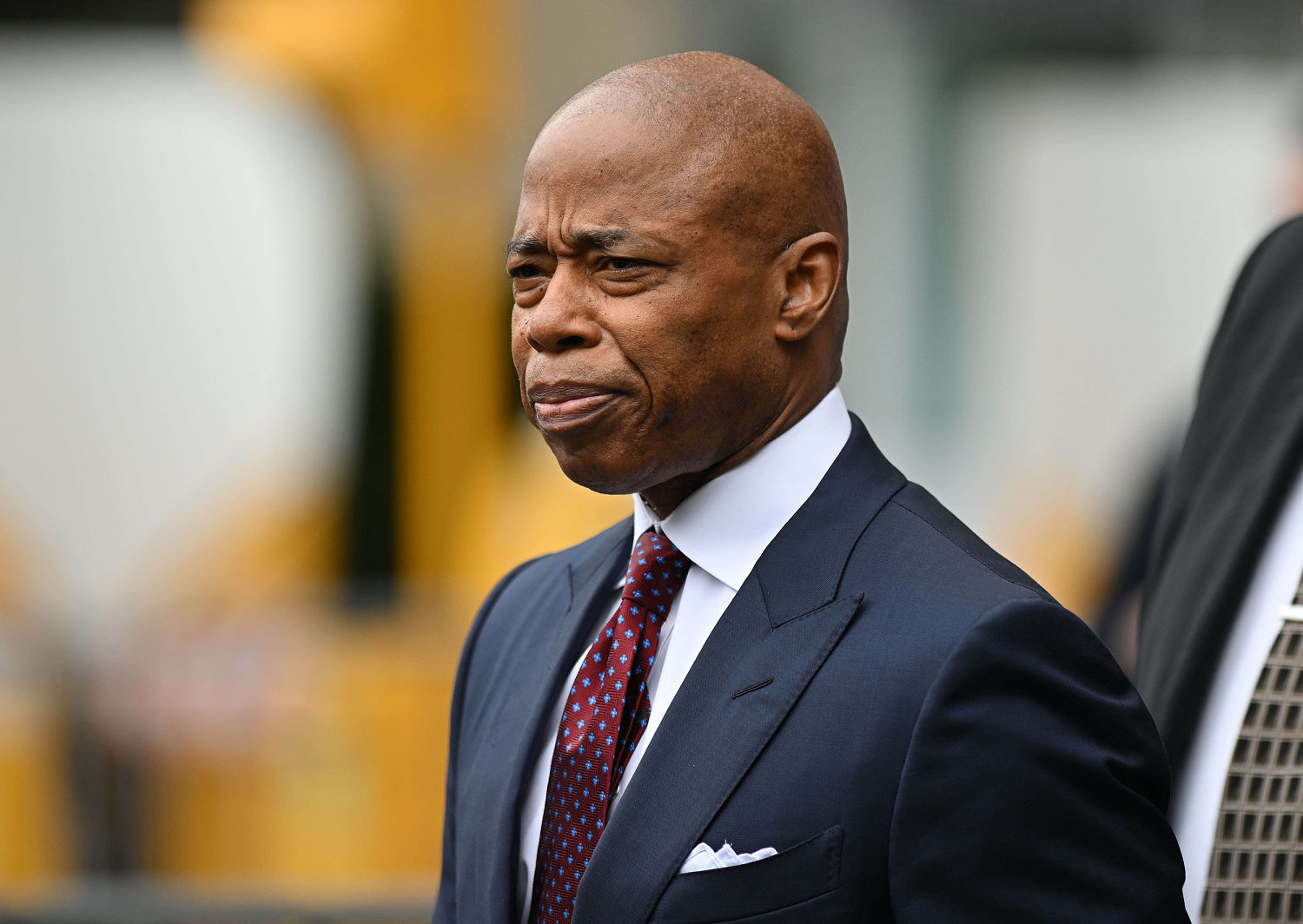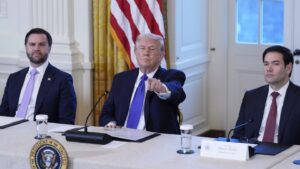Politics
Eric Adams hopes Supreme Court’s curbing of corruption prosecutions helps gut his own

When the Supreme Court’s Republican-appointed majority curbed the use of federal bribery law against state and local officials this past term, Justice Ketanji Brown Jackson’s dissent called the “absurd and atextual reading of the statute” one that “only today’s Court could love.”
Eric Adams might love it, too.
Ask Jordan questions during his Reddit AMA on Wednesday at 2 p.m. ETwhere he will discuss the biggest cases of the Supreme Court’s next term.
On Monday, New York City’s first indicted sitting mayor moved to dismiss the federal bribery charge against him, citing that recent Supreme Court precedent, called Snyder v. United States.
“Just three months ago, the Supreme Court rebuked the Justice Department for adopting an ‘unfathomable’ interpretation of the federal-program bribery statute,” the Democratic mayor’s lawyers wrote in their trial court motionciting the Snyder case.
“Yet here goes the Department again,” they argued, surmising that:
It appears that after years of casting about for something, anything, to support a federal charge against New York City Mayor Eric Adams, prosecutors had settled on a theory that depended on the Department’s longstanding view that Section 666 [the bribery law at issue] criminalizes gratuities, including gifts meant to curry favor with governmental officials but not linked to any specific question or matter. When the Supreme Court rejected that interpretation in June, prosecutors simply added a few vague allegations and called their theory bribery — “a far more serious offense than gratuities” [a quote from the Snyder opinion].
Arguing that “the government’s makeover doesn’t work,” Adams’ lawyers wrote:
The indictment does not allege that Mayor Adams agreed to perform any official act at the time that he received a benefit. Rather, it alleges only that while serving as Brooklyn Borough President –not Mayor, or even Mayor-elect — he agreed generally to assist with the ‘operation’ or ‘regulation’ of a Turkish Consulate building in Manhattan, where he had no authority whatsoever, in exchange for travel benefits (e.g., upgrades to vacant business-class seats and a car ride to a restaurant).
They concluded the 25-page filing by writing:
In short, the bribery count in the indictment suffers from the same fundamental legal problems that have long plagued the Justice Department’s aggressive targeting of prominent public officials: a sweeping view of federal statutes that criminalizes routine conduct and replaces measured ethics rules with the blunt force of federal criminal law. The consequence is a lack of fair notice to defendants and the kind of highly selective enforcement on display here.
Now, this is the type of argument that the Supreme Court has embraced in recent years — not just in the Snyder case but also in a string of appeals dating back at least to the 2016 ruling in favor of former Virginia Gov. Bob McDonnell that narrowed corruption-related prosecutions.
It’s too early to know whether Adams, who has pleaded not guilty, will be able to successfully harness that judicial skepticism to get out of his indictment, which we’re all still digesting. But however heavy-handed the defense argument sounds, it’s the sort of claim that Adams’ lawyers would be foolish not to make, given the state of the law and the Supreme Court.
The Justice Department will get to respond to Adams’ motion, and federal prosecutors will likely disagree with both the defendant’s understanding of the law and how it applies to the facts of his case. (Adams’ motion only concerns the bribery allegation, and we should expect him to separately challenge the other charges in the indictment, including those related to allegedly illegal campaign contribution dealings.)
Indeed, prosecutors probably aren’t too surprised at Adams’ argument. At least they shouldn’t be. In strategizing the case, they likely will have considered the charges against the backdrop of how they would fare on an inevitable appeal if there’s a conviction. But however damning the allegations against the mayor may seem, the justices seemingly stand ready to save white-collar defendants from charges that might possibly be seen as criminalizing politics, however shady that politics is.
TheDeadline: Legal Newsletterreturns Oct. 4.Subscribefor expert analysis on the top legal stories of the week, including updates from the new Supreme Court term and developments in Donald Trump’s legal cases.
Jordan Rubin is the Deadline: Legal Blog writer. He was a prosecutor for the New York County District Attorney’s Office in Manhattan and is the author of “Bizarro,” a book about the secret war on synthetic drugs. Before he joined BLN, he was a legal reporter for Bloomberg Law.
Politics
Cornyn rakes in record fundraising ahead of Texas primary
Sen. John Cornyn raised $7 million during the fourth quarter of his reelection campaign — the highest total of his career as the Republican fights a bitter primary challenge.
The fundraising report, shared first with Blue Light News, shows Cornyn has more than $15 million in cash on hand, including money raised through his two joint fundraising committees. It represents more than twice as much as he raised in the third quarter of 2025.
The four-term incumbent is up against Texas Attorney General Ken Paxton and Rep. Wesley Hunt. Polls show a tight race between Paxton and Cornyn, with Hunt in third, ahead of the early March primary.
Cornyn has poured money into attacking Paxton, a conservative firebrand who has wide backing from the MAGA base in Texas but has significant political and personal baggage. Paxton has faced multiple state and federal investigations and his wife filed for divorce last summer.
“Texans understand that President Trump’s legislative agenda and the Senate Republican majority are at risk unless Sen. Cornyn is the nominee,” said Andy Hemming, Cornyn’s campaign manager, in a statement. “We are executing our plan to win this race, and we will win.”
Paxton and Hunt have not yet released their own latest fundraising hauls. The race is expected to go to a runoff in late May.
Politics
Insurer CEOs testifying before House health subcommittee Jan. 22
House Republicans are summoning top health insurance executives to testify on Capitol Hill this month as part of a broader effort to examine health care costs, a move that comes weeks after enhanced Affordable Care Act tax credits expired Dec. 31. The hearing announcement comes amid Democrat criticism that Republicans allowed the enhanced ACA subsidies to lapse — a decision they argue is burdening Americans who relied on the enhanced tax credits to help them afford Obamacare premiums…
Read More
-

 The Dictatorship11 months ago
The Dictatorship11 months agoLuigi Mangione acknowledges public support in first official statement since arrest
-

 The Dictatorship4 months ago
The Dictatorship4 months agoMike Johnson sums up the GOP’s arrogant position on military occupation with two words
-

 Politics11 months ago
Politics11 months agoFormer ‘Squad’ members launching ‘Bowman and Bush’ YouTube show
-

 Politics11 months ago
Politics11 months agoBlue Light News’s Editorial Director Ryan Hutchins speaks at Blue Light News’s 2025 Governors Summit
-

 Politics11 months ago
Politics11 months agoFormer Kentucky AG Daniel Cameron launches Senate bid
-

 The Dictatorship11 months ago
The Dictatorship11 months agoPete Hegseth’s tenure at the Pentagon goes from bad to worse
-
Uncategorized1 year ago
Bob Good to step down as Freedom Caucus chair this week
-

 Politics9 months ago
Politics9 months agoDemocrat challenging Joni Ernst: I want to ‘tear down’ party, ‘build it back up’







